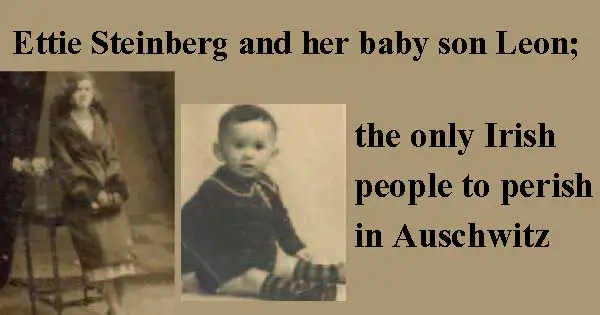Each year on January 27th people around the world take time out to remember the millions of Jewish people that were mercilessly executed in the 1930s and 40s by Adolf Hitler’s Nazi regime.

Ettie Steinberg and her son Leon Gluck. Photo Copyright – Conan Kennedy and www.hetireland.org
The day is known as Holocaust Memorial Day, and people in Ireland may want to take a moment to remember a woman named Ettie Steinberg, and her baby son Leon.
Ettie and Leon are believed to be the only two Irish people that lost their lives during the Holocaust.
Ettie Steinberg was born in 1914 in a small town in the former Czechoslovakia, one of seven children. In the 1920s, the family moved to Dublin and Ettie attended St Catherine’s School in Donore Avenue.
Once she had grown up, Ettie worked as an apprentice to a top seamstress in Ireland. One of her sisters, Fanny Frankel of Toronto, described her as having ‘golden hands’.
Ettie got married and moved to Belgium
Ettie met and fell in love with a Belgian goldsmith named Vogtjeck Gluck. He was working in Dublin and the two got married at the Greenville Hall Synagogue in Dublin on July 22 1937. The young couple moved to Antwerp to run Vogtjeck’s goldsmith business.
After a happy start to their married life, Ettie and Vogtjeck came under threat from Hitler’s Nazi regime. Jewish people were being persecuted throughout mainland Europe, so they decided to move to the relatively safety of France. There, Ettie gave birth to a baby boy, Leon. The family moved around France for a couple of years until settling in the south.
However, in 1942, the Nazi round-up of Jews had spread to the south of France meaning Ettie and her family were in great danger. Her relatives in Dublin sent visas, which would allow the family to travel to Northern Ireland away from the threat of Nazi persecution.
Tragically, Ettie and her husband were discovered and arrested the day before the visas arrived. They were put on a train and sent to the Nazi concentration camp Auschwitz.
Coded message sent to her family in Dublin
Ettie knew the fate that awaited her at Auschwitz. During the train journey she sent a coded message back to her family in Ireland, to thank them for their efforts, and to say goodbye.
The letter said:
‘Uncle Lechem, we did not find, but we found Uncle Tisha B’av.’
She threw the letter out of the moving train in the hope that it would reach her family. Amazingly, it did, after a passer-by found it and posted it to Dublin.
The coding of the message meant it was able to make its way past the censorship officials. Lechem is the Hebrew word for bread, and Tisha B’av is a Jewish fast day, commemorating the destruction of the temple.
‘We did not find bread, but only destruction’
Therefore, Ettie’s final message can be translated to: ‘We did not find bread, but only destruction.’
In the context in which it was written, Ettie’s message was clear; she had not received the visas in time and was now facing execution after being arrested.
Ettie’s family understood and began a desperate search to find out what had happened to her. They wrote to the Red Cross and even the Vatican to try and track down her movements.
Tragically, they later found the Gluck family name on official documents recording the locations and transportation of Jewish prisoners. Ettie and her husband Vogtjeck, and baby son Leon, were deported from Drancy outside Paris on September 2 1942. They arrived in Auschwitz two days later, where it is believed they were executed within hours of arriving.